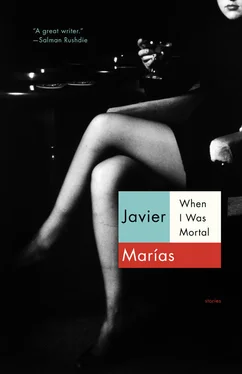I tried to work out where that man, my neighbour, was looking, and I managed to fix on a space that was not small enough for me to rest my gaze on entirely and take an interest in whatever it was that was interesting, but at least in that way, by imitating or trying to guess the direction of his gaze, I could discount most of everything else that lay before me, an entire beach.
“What are you looking at?” my wife asked from the bed. It was very hot and she had placed a wet towel on her forehead, it almost covered her eyes, which were not in the least interested in looking at anything.
“I don’t know yet,” I said without turning round. “I’m trying to see what another man here beside me on a neighbouring balcony is looking at.”
“Why? What does it matter to you? Don’t be so nosy.”
It didn’t matter to me, in fact, but in summer wasting time is what you try hardest to do, if not, you don’t really feel that it’s summer, which is supposed to be slow and purposeless.
According to my calculations and observations, the man to my right had to be looking at one of four people, all fairly close together and lined up in the back row, far from the water’s edge. To the right of these people was a small empty space, to their left as well, which was what made me think that he was looking at one of those four. The first person (from left to right, as they say in photo captions) had her face turned to me or us, for she was sunbathing lying on her back: a youngish woman, she was reading a newspaper, she had the top part of her bikini undone, but hadn’t removed it entirely (that’s still rather frowned upon in San Sebastián). The second person was sitting down, she was older, plumper, wearing a one-piece bathing suit and a straw hat, she was smearing suncream on herself: she must be a mother, but her children were nowhere to be seen, perhaps they were playing by the sea. The third person was a man, possibly her husband or her brother, he was thinner, he was pretending to shiver as he stood on his towel, as if he had just emerged from the sea (he must have been pretending to shiver because the sea would certainly not be cold). The fourth person was the easiest to make out because he was wearing clothes, at least his top half was covered: he was an older man (the hair at the nape of his neck was grey) sitting with his back to us, erect, as if he, in turn, were watching or surveying someone on the shore or some rows ahead, the beach his theatre. I fixed my gaze on him: he was evidently alone, he had nothing to do with the man to his left, the man who was pretending to shiver. He was wearing a short-sleeved, green T-shirt, you couldn’t see if he had swimming trunks on or trousers, if he was fully dressed, most inappropriate on a beach, if he was, that would certainly attract attention. He was scratching his back, scratching his waist, he had a lot of fat around his waist, it must have weighed on him, he was one of those men who have great difficulty getting to their feet, to do so they have to throw their arms forward, with their fingers outstretched as if someone were pulling them. He was scratching his back, almost as if he were pointing to it. I didn’t have time to find out if he would get to his feet like that, with difficulty, nor if he was wearing trousers or swimming trunks, but I did find out that he was the man my neighbour was looking at, because suddenly, with my binoculars fixed at last on his thick waist and his broad back, I saw him collapse, fall forwards in a sitting position, the way puppets fall when the hand holding diem lets go of the strings. I had heard a brief, muffled noise, and I just had time to see that what was disappearing from the balcony to my right was not the arm of my neighbour with the binoculars, but his arm and the barrel of a gun. I don’t think anyone realized what had happened, although the man who had been shivering abruptly stopped, no longer cold.
I OFTEN USED to pretend I believed in ghosts, and I did so blithely, but now that I am myself a ghost, I understand why, traditionally, they are depicted as mournful creatures who stubbornly return to the places they knew when they were mortal. For they do return. Very rarely are they or we noticed, the houses we lived in have changed and the people who live in them do not even know of our past existence, they cannot even imagine it: like children, these men and women believe that the world began with their birth, and they never wonder if, on the ground they tread, others once trod with lighter steps or with fateful footfalls, if between the walls that shelter them others heard whispers or laughter, or if someone once read a letter out loud, or strangled the person he most loved. It’s absurd that, for the living, space should endure while time is erased, when space is, in fact, the depository of time, albeit a silent one, telling no tales. It’s absurd that life should be like that for the living, because what comes afterwards is its polar opposite, and we are entirely unprepared for it. For now time does not pass, elapse or flow, it perpetuates itself simultaneously and in every detail, though to speak of “now” is perhaps a fallacy. That is the second worst thing, the details, because anything that we experienced or that made even the slightest impact on us when we were mortal reappears with the awful concomitant that now everything has weight and meaning: the words spoken lightly, the mechanical gestures, the accumulated afternoons of childhood parade past singly, one after the other, the effort of a whole lifetime-establishing routines that level out both days and nights — turns out to have been pointless, and each day and night is recalled with excessive clarity and singularity and with a degree of reality incongruous with our present state which knows nothing now of touch. Everything is concrete and excessive, and the razor edge of repetition becomes a torment, because the curse consists in remembering everything , the minutes of each hour of each day lived through, the minutes and hours and days of tedium and work and joy, of study and grief and humiliation and sleep, as well as those of waiting, which formed the greater part.
But, as I have already said, that is only the second worst thing, there is something far more wounding, which is that now I not only remember what I saw and heard and knew when I was mortal, but I remember it in its entirety, that is, including what I did not see or know or hear, even things that were beyond my grasp, but which affected me or those who were important to me, and which possibly had a hand in shaping me. You discover the full magnitude of what you only intuited while alive, all the more as you become an adult, I can’t say older because I never reached old age: that you only know a fragment of what happens to you and that when you believe yourself capable of explaining or recounting what has happened to you up until a particular date, you do not have sufficient information, you do not know what other people’s intentions were or the motivations behind impulses, you have no knowledge of what is hidden: the people closest to us seem like actors suddenly stepping out in front of a theatre curtain, and we have no idea what they were doing only a second earlier, when they were not there before us. Perhaps they appear disguised as Othello or as Hamlet and yet the previous moment they were smoking an impossible, anachronistic cigarette in the wings and glancing impatiently at the watch which they have now removed in order to seem to be someone else. Likewise, we know nothing about the events at which we were not present and the conversations we did not hear, those that took place behind our back and mentioned us or criticized us or judged us and condemned us. Life is compassionate, all lives are, at least that is the norm, which is why we consider as wicked those people who do not cover up or hide or lie, those who tell everything that they know and hear, as well as what they do and think. We call them cruel. And it is in that cruel state that I find myself now.
Читать дальше












